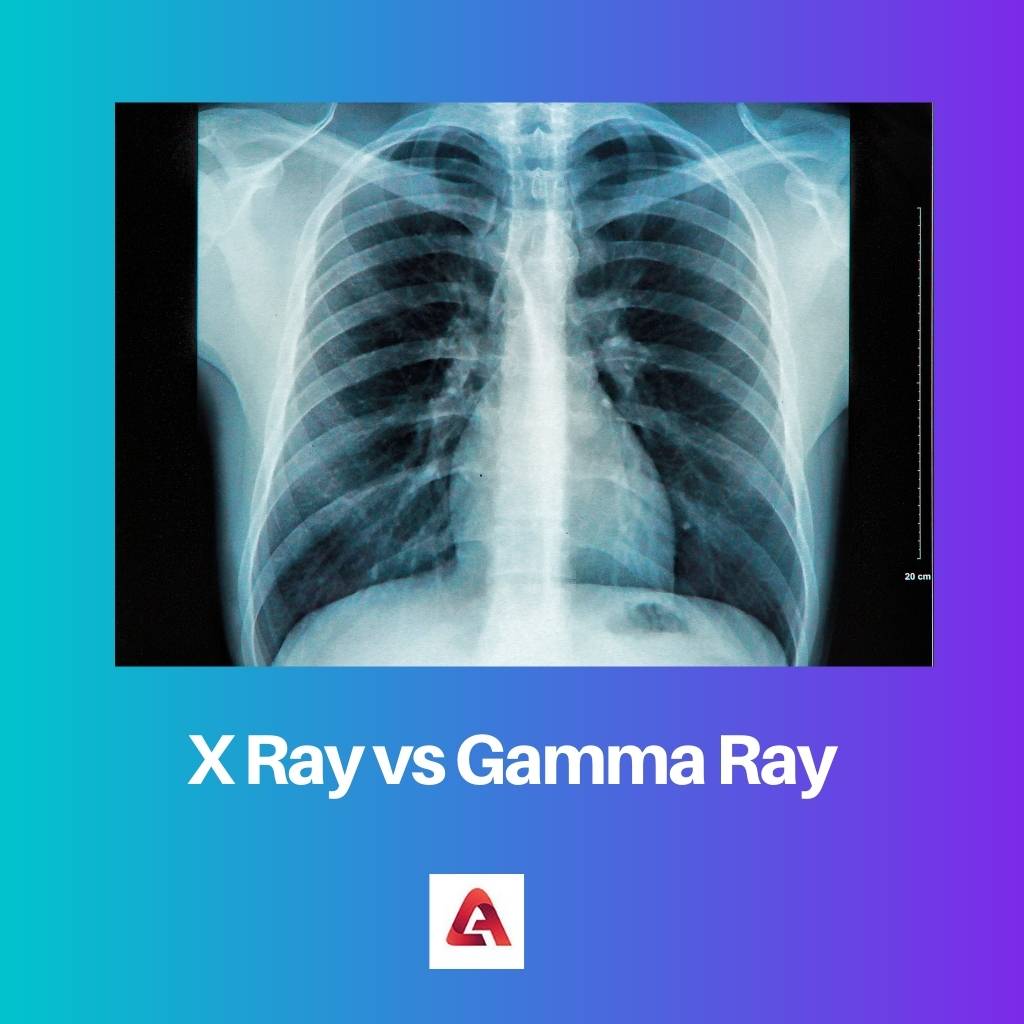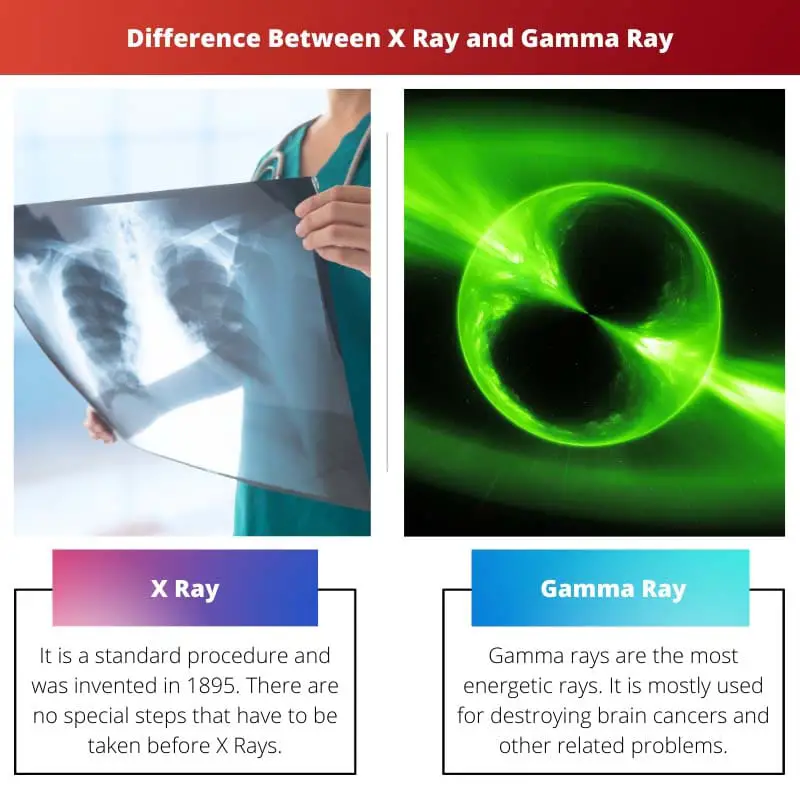X Rays and Gamma Rays are both very familiar terms, as the name suggest, both of them are rays with high energy level. Many people know them individually but don’t know why they are different. It is important to know the difference to understand them better and how they work.
Below are all the differences between X-Ray and Gamma-Ray to have a better understanding of both of them.
Key Takeaways
- X-rays have a lower energy and longer wavelength than Gamma-rays.
- X-rays are commonly used for medical imaging, while Gamma-rays are used for radiation therapy and nuclear imaging.
- Dense materials like bones absorb X-rays, while Gamma-rays can penetrate through thick layers of matter.
X Ray vs Gamma Ray
X-rays are a type of electromagnetic radiation with higher energy and shorter wavelengths than visible light, produced by the collision of high-speed electrons with matter in metal form. Gamma rays are the highest-energy form of electromagnetic radiation produced by the decay of atomic nuclei.

X Rays were invented by a German professor, although it does not have any side effects, if used carelessly with high radiation, they may cause some harm. In history, some people have died due to exposure to radiation resulting in Skin cancers. Its uses are not limited to fractures, and even there are CT scans and dental problems too.
Gamma Rays are more energetic rays that are used for severe disease, not only this, they can also be used for space-related information. It has a smaller wavelength with more penetration power.
It causes more harm than any other radiation. It can be obtained in more than one way. It should be handled with care as more exposure to the skin may cause some allergic reactions.
Comparison Table
| Parameters of Comparison | X-Ray | Gamma Ray |
|---|---|---|
| Production with | By losing the energy of energetic electrons. | Radioactive nuclei |
| Wavelength | Larger | Smaller |
| Energy | Less energy | More energy |
| Penetration power | Less power | More power |
| Affordable | More affordable | Less affordable |
What is X-Ray?
It is a standard procedure and was invented in 1895. There are no special steps that have to be taken before X Rays. Doctors asked for X Rays in case of examining discomfort or pain, diagnosing disease, and checking if the treatment is working or not.
It has several types and uses. Even once they are used for the purpose of hair removal but FDA banned them due to the dangerous effects it may cause to health. One fact about X-Ray is that it does not show the diamonds.
Following are some conditions for which a doctor may call for X Rays:
- Bone cancer
- Breast tumours
- Enlarged heart
- Blocked blood vessels
- Conditions affecting your lungs
- Digestive problems
- Fractures
- Infections
- Osteoporosis
- Arthritis
- Tooth decay
- Needing to retrieve swallowed items
It uses less quantity of radiation to create an image of the body. It is not advisable if you are pregnant as it may cause some harm to the baby. Otherwise, also it may have some side effects that include hives, itching, nausea, light-headedness, metallic taste in the mouth, etc.
After the process, you can see the results. The doctor checks them and tells you if there is a problem or not.

What is Gamma Ray?
Gamma rays are the most energetic rays. It is mostly used for destroying brain cancers and other related problems. Rays focus on cells that are causing the problem.
Gamma radiation detectors on satellites were launched in 1960 to monitor nuclear tests. More than expected, explosions were founded. They are produced in the following ways:
- Nuclear Fusion: it powers the sun and stars.
- Nuclear Fission: splitting a nucleus into two parts.
- Alpha Decay: heavy nucleus gives off a helium-4.
- Gamma Decay: when there is high energy in the nucleus of an atom.
Gamma Rays are used for the following purposes:
- Sterilizing medical-related equipment.
- Sterilizing irradiated food.
- Tracers for medicines.
- To kill cancerous cells, also called radiotherapy.
- For astronomy.
They can pass through most of the materials; they cannot be captured or reflected by mirrors. It can be used for deterring elements of planets.
Gamma Rays and X-rays are similar rays that expose radiation. Suppose given a choice, and gamma rays should be avoided due to their harmful effects on the skin, as their energy level is very high also. In that case, everyone cannot afford them, and therefore are used for serious and harmful diseases.

Main Differences Between X-Ray and Gamma Ray
- X Rays are older than Gamma Rays as they were invented in 1895 by Wilhelm Roentgen, whereas Gamma Rays were observed later on in 1900 for the first time by Paul Villard.
- Both of them are produced in different ways, while for producing X Rays, energetic electrons lose their energy, for producing Gamma Rays, radioactive nuclei are used.
- They also differ in terms of wavelength and frequency, X Rays have a larger wavelength and smaller frequency as compared to Gamma Ray, which has a smaller wavelength and larger frequency.
- They have a different level of energy in photons, photons of Gamma Rays have more energy as compared to X Ray’s photons, this further results in a stronger ionizing ability of Gamma Rays.
- In terms of penetration, Gamma Rays have more penetration power in comparison to X Rays, that has relatively low penetration power.
- When it comes to affordability, Gamma Rays are less affordable as compared to X Rays, which are more affordable or quite inexpensive.
- Gamma Rays are more harmful to the body than X Rays. Therefore most people prefer X Rays over Gamma Rays.

- https://inis.iaea.org/search/search.aspx?orig_q=RN:15016238
- https://iopscience.iop.org/article/10.1086/309878/meta